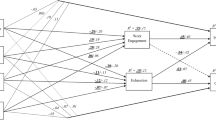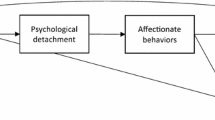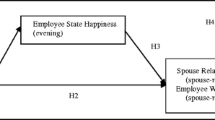Abstract
The present diary study investigates, at the within-person level, how job satisfaction mediates the relationship between self-rated job performance and recovery experiences (i.e., psychological detachment from work and relaxation) during off-job time. Furthermore, we explore the effects of these two recovery experiences on couple´s well-being. Data were collected from 145 dual-earner couples (N = 290 participants; N = 1450 occasions) with a daily diary design (five consecutive working days). Multilevel analyses showed that daily job performance positively predicted psychological detachment and relaxation, and that daily job satisfaction partially mediated this relationship. In addition, we found that psychological detachment and relaxation have positive effects on own and partner´s indicators of well-being (i.e., relationship satisfaction and positive emotions). The benefits of recovery go beyond the individual and affect their partner´s level of well-being.

Similar content being viewed by others
References
Ackerman, R. A., Kashy, D. A., Donnellan, M. B., & Conger, R. D. (2011). Positive-engagement behaviors in observed family interactions: A social relations perspective. Journal of Family Psychology, 25, 719–730. doi:10.1037/a0025288.
Bakker, A. B., & Demerouti, E. (2014). Job demands-resources theory. In P. Y. Chen & C. L. Cooper (Eds.), Wellbeing: A complete reference guide (volume III (pp. 37–64). Chichester: Wiley-Blackwell.
Bakker, A. B., Sanz-Vergel, A. I., Rodriguez-Muñoz, A., & Oerlemans, W. (2015). The state version of the recovery experience questionnaire: A multilevel confirmatory factor analysis. European Journal of Work & Organizational Psychology, 24, 350–359. doi:10.1080/1359432X.2014.903242.
Bauer, D. J., Preacher, K. J., & Gil, K. M. (2006). Conceptualizing and testing random indirect effects and moderated mediation in multilevel models: new procedures and recommendations. Psychological Methods, 11(2), 142–163. doi:10.1037/1082-989X.11.2.142.
Byrne, B. (2011). Structural equation modeling with Mplus: Basic concepts, applications, and programming. New York, NY: Routledge.
Clark, L., & Watson, D. (1995). Constructing validity: Basic issues in objective scale development. Psychological Assessment, 7, 309–319. doi:10.1037/1040-3590.7.3.309.
Daniel, S., & Sonnentag, S. (2014). Work to non-work enrichment: The mediating roles of positive affect and positive work reflection. Work & Stress, 28, 49–66. doi:10.1080/02678373.2013.872706.
Demerouti, E., & Rispens, S. (2014). Improving the image of student-recruited samples: A commentary. Journal of Occupational and Organizational Psychology, 87, 34–41. doi:10.1111/joop.12048.
Diener, E., Suh, E. M., Lucas, R. E., & Smith, H. L. (1999). Subjective well-being: Three decades of progress. Psychological Bulletin, 125(2), 276–302. doi:10.1037/0033-2909.125.2.276.
Etzion, D., Eden, D., & Lapidot, Y. (1998). Relief from job stressors and burnout: Reserve service as a respite. Journal of Applied Psychology, 83, 577–585. doi:10.1080/02134748.2014.918824.
Falconier, M. K., Jackson, J. B., Hilpert, P., & Bodenmann, G. (2015). Dyadic coping and relationship satisfaction: A meta-analysis. Clinical Psychology Review, 42, 28–46. doi:10.1016/j.cpr.2015.07.002.
Fisher, G. G., Matthews, R. A., & Gibbons, A. M. (2016). Developing and investigating the use of single-item measures in organizational research. Journal of Occupational Health Psychology, 21, 3–23. doi:10.1037/a0039139.
Fritz, C., & Sonnentag, S. (2006). Recovery, well-being, and performance-related outcomes: The role of workload and vacation experiences. Journal of Applied Psychology, 91, 936–945. doi:10.1037/0021-9010.91.4.936.
Fritz, C., Yankelevich, M., Zarubin, A., & Barger, P. (2010). Happy, healthy and productive: The role of detachment from work during non-work time. Journal of Applied Psychology, 95, 977–983. doi:10.1037/a0019462.
Gabriel, A. S., Diefendorff, J. M., & Erickson, R. J. (2011). The relations of daily task accomplishment satisfaction with changes in affect: A multilevel study in nurses. Journal of Applied Psychology, 96, 1095–1104. doi:10.1037/a0023937.
Geldhof, G. J., Preacher, K. J., & Zyphur, M. J. (2014). Reliability estimation in a multilevel confirmatory factor analysis framework. Psychological Methods, 19(1), 72–91. doi:10.1037/a0032138.
Geurts, S. A. E., & Sonnentag, S. (2006). Recovery as an explanatory mechanism in the relation between acute stress reactions and chronic health impairment. Scandinavian Journal of Work, Environment & Health, 32, 482–492. doi:10.5271/sjweh.1053.
Green, A. S., Rafaeli, E., Bolger, N., Shrout, P. E., & Reis, H. T. (2006). Paper or plastic? Data equivalence in paper and electronic diaries. Psychological Methods, 11, 87–105. doi:10.1037/1082-989X.11.1.87.
Hahn, V. C., Binnewies, C., & Dormann, C. (2014). The role of partners and children for employees’ daily recovery. Journal of Vocational Behavior, 85, 39–48. doi:10.1016/j.jvb.2014.03.005.
Hahn, V. C., Binnewies, C., Sonnentag, S., & Mojza, E. J. (2011). Learning how to recover from job stress: Effects of a recovery training program on recovery, recovery-related self-efficacy, and well-being. Journal of Occupational Health Psychology, 16, 202–216. doi:10.1037/a0022169.
Hahn, V. C., & Dormann, C. (2013). The role of partners and children for employees’ psychological detachment from work and well-being. Journal of Applied Psychology, 98, 26–36. doi:10.1037/a0030650.
Ilies, R., Wilson, K. S., & Wagner, D. T. (2009). The spillover of daily job satisfaction onto employees’ family lives: The facilitating role of work-family integration. Academy of Management Journal, 52, 87–102. doi:10.5465/AMJ.2009.36461938.
Kashy, D. A., & Kenny, D. A. (2000). The analysis of data from dyads and groups. In H. T. Reis & C. M. Judd (Eds.), Handbook of research methods in social psychology (pp. 451–477). New York: Cambridge University Press.
Kenny, D. A., & Kashy, D. A. (2011). Dyadic data analysis using multilevel modeling. In J. Hox & J. K. Roberts (Eds.), The handbook of advanced multilevel analysis (pp. 335–370). London: Taylor & Francis.
Kenny, D. A., Kashy, D. A., & Cook, W. L. (2006). Dyadic data analysis. New York: The Guilford Press.
Kunin, T. (1955). The construction of a new type of attitude measure. Personnel Psychology, 9, 65–78. doi:10.1111/j.1744-6570.1955.tb01189.x.
Ledermann, T., & Kenny, D. A. (2017). Analyzing dyadic data with multilevel modeling versus structural equation modeling: A tale of two methods. Journal of Family Psychology. doi:10.1037/fam0000290.
Leroy, S. (2009). Why is it so hard to do my work? The challenge of attention residue when switching between work tasks. Organizational Behavior and Human Decision Processes, 109, 168–181. doi:10.1016/j.respol.2015.01.019.
Locke, E. A., & Latham, G. P. (1990). A theory of goal setting and task performance. Englewood Cliffs, NJ: Prentice Hall.
Mathieu, J. E., & Taylor, S. R. (2006). Clarifying conditions and decision points for meditational type inferences in organizational behaviour. Journal of Organizational Behavior, 27, 1031–1056. doi:10.1002/job.406.
Muthén, L. K., & Muthén, B. O. (2010). MPLUS user’s guide (6th ed.). Los Angeles, CA: Muthén & Muthén.
Oerlemans, W. G., Bakker, A. B., & Demerouti, E. (2014). How feeling happy during off-job activities helps successful recovery from work: A day reconstruction study. Work & Stress, 28(2), 198–216. doi:10.1080/02678373.2014.901993.
Ohly, S., Sonnentag, S., Niessen, C., & Zapf, D. (2010). Diary studies in organizational research: An introduction and some practical recommendations. Journal of Personnel Psychology, 9, 79–93. doi:10.1027/1866-5888/a000009.
Organ, D. W. (1988). A restatement of the satisfaction-performance hypothesis. Journal of Management, 14(4), 547–557. doi:10.1177/014920638801400405.
Park, Y., & Fritz, C. (2015). Spousal recovery support, recovery experiences, and life satisfaction crossover among dual-earner couples. Journal of Applied Psychology, 100, 557–566. doi:10.1037/a0037894.
Rasbash, J., Browne, W., Healy, M., Cameron, B., & Charlton, C. (2002). MLwiN (Version 1.10.006): Interactive software for multilevel analysis. Centre for Multilevel Modelling, Institute of Education, University of London.
Rotundo, M., & Sackett, P. R. (2002). The relative importance of task, citizenship, and counterproductive performance to global ratings of job performance: A policy-capturing approach. Journal of Applied Psychology, 87(1), 66–80. doi:10.1037/0021-9010.87.1.66.
Rusbult, C. E., & Buunk, B. P. (1993). Commitment processes in close relationships: An interdependence analysis. Journal of Social and Personal Relationships, 10, 175–204. doi:10.1177/026540759301000202.
Rush, J., & Hofer, S. M. (2014). Differences in within-and between-person factor structure of positive and negative affect: Analysis of two intensive measurement studies using multilevel structural equation modeling. Psychological Assessment, 26(2), 462–473. doi:10.1037/a0035666.
Siltaloppi, M., Kinnunen, U., & Feldt, T. (2009). Recovery experiences as moderators between psychosocial work characteristics and occupational well-being. Work and Stress, 23, 330–348. doi:10.1080/02678370903415572.
Smit, B. W. (2016). Successfully leaving work at work: The self-regulatory underpinnings of psychological detachment. Journal of Occupational and Organizational Psychology, 89, 493–514. doi:10.1111/joop.12137.
Sonnentag, S., & Bayer, U. V. (2005). Switching off mentally: Predictors and consequences of psychological detachment from work during off-job time. Journal of Occupational Health Psychology, 10, 393–414. doi:10.1037/1076-8998.10.4.393.
Sonnentag, S., Binnewies, C., & Mojza, E. J. (2008a). “Did you have a nice evening?” A day-level study on recovery experiences, sleep, and affect. Journal of Applied Psychology, 93, 674–684. doi:10.1037/0021-9010.93.3.674.
Sonnentag, S., & Fritz, C. (2007). The recovery experience questionnaire: Development and validation of a measure for assessing recuperation and unwinding from work. Journal of Occupational Health Psychology, 12, 204–221. doi:10.1037/1076-8998.12.3.204.
Sonnentag, S., & Fritz, C. (2015). Recovery from job stress: The stressor-detachment model as an integrative framework. Journal of Organizational Behavior, 36, 72–103. doi:10.1002/job.1924.
Sonnentag, S., Mojza, E. J., Binnewies, C., & Scholl, A. (2008b). Being engaged at work and detached at home: A week-level study on work engagement, psychological detachment, and affect. Work & Stress, 22, 257–276. doi:10.1080/02678370802379440.
Sonnentag, S., Mojza, E. J., Demerouti, E., & Bakker, A. B. (2012). Reciprocal relations between recovery and work engagement: The moderating role of job stressors. Journal of Applied Psychology, 97, 842–853. doi:10.1037/a0028292.
Sonnentag, S., Perrewe, P. L., & Ganster, D. C. (2009). Current perspectives on job-stress recovery. Bingley: Esmeralda Group Publishing Limited.
Stone, A. A., Kennedy-Moore, E., & Neale, J. M. (1995). Association between daily coping and end-of-day mood. Health Psychology, 14, 341–349. doi:10.1037/0278-6133.14.4.341.
Stone, A. A., Shiffman, S., Schwartz, J. E., Broderick, J. E., & Hufford, M. R. (2003). Patient compliance with paper and electronic diaries. Controlled Clinical Trials, 24, 182–199. doi:10.1016/S0197-2456(02)00320-3.
Van Katwyk, P. T., Fox, S., Spector, P. E., & Kelloway, E. K. (2000). Using the job-related affective well-being scale (JAWS) to investigate affective responses to work stressors. Journal of Occupational Health Psychology, 5, 219–230. doi:10.1037/1076-8998.5.2.219.
Volmer, J., Binnewies, C., Sonnentag, S., & Niessen, C. (2012). Do social conflicts with customers at work encroach upon our private lives? A diary study. Journal of Occupational Health Psychology, 17, 304–315. doi:10.1037/a0028454.
Vroom, V. H. (1964). Work and motivation. New York: Wiley.
Weinstein, N., & Ryan, R. M. (2010). When helping helps: Autonomous motivation for prosocial behavior and its influence on well-being for the helper and recipient. Journal of Personality and Social Psychology, 98(2), 222–244. doi:10.1037/a0016984.
Weiss, H. M., & Cropanzano, R. (1996). An affective events approach to job satisfaction. In B. M. Staw & L. L. Cummings (Eds.), Research in organizational behavior (Vol. 18, pp. 1–74). Greenwich, CT: JAI Press.
Westman, M. (2001). Stress and strain crossover. Human Relations, 54, 717–751. doi:10.1177/0018726701546002.
Williams, L. J., & Anderson, S. E. (1991). Job satisfaction and organizational commitment as predictors of citizenship and in-role behaviors. Journal of Management, 17, 601–617. doi:10.1177/014920639101700305.
Author information
Authors and Affiliations
Corresponding author
Rights and permissions
About this article
Cite this article
Rodríguez-Muñoz, A., Sanz-Vergel, A.I., Antino, M. et al. Positive Experiences at Work and Daily Recovery: Effects on Couple’s Well-Being. J Happiness Stud 19, 1395–1413 (2018). https://doi.org/10.1007/s10902-017-9880-z
Published:
Issue Date:
DOI: https://doi.org/10.1007/s10902-017-9880-z




